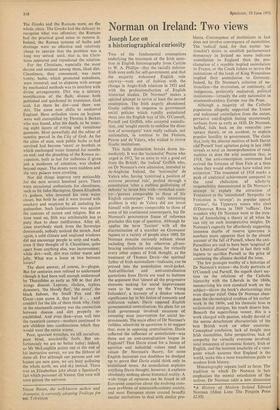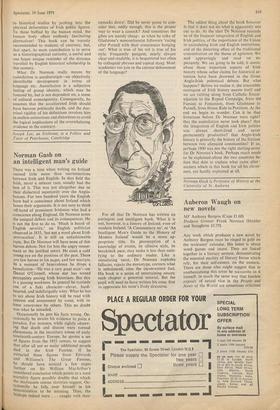Norman on Ireland: Two views
Joseph Lee on a historiographical curiosity
Two of the fundamental assumptions underlying the treatment of the Irish ques- tion in English historiography from Carlyle to W. A. Phillips—that the racially inferior Irish were unfit for self-government, and that the majority welcomed English rule anyway—went out of fashion with the change in Anglo-Irish relations in 1921 and with the professionalisation of English historical studies. Dr Norman* makes a spirited attempt to revive at least the second assumption. The Irish eagerly abandoned Gaelic culture in response to government social policies which rapidly assimilated them into the English way of life. O'Connell, Parnell and Griffith, who accepted assimila- tion, and 'sought merely to redefine the direc- tion of sovereignty' were really radicals, not nationalists, in contrast to the Fenians, Pearse and de Valera, who wished to revive Gaelic institutions.
This futile distinction breaks down im- mediately. It was the 'nationalist' Pearse who urged in 1912, let us unite to win a good act from the British', the 'radical' Griffith who, on Dr Norman's own admission, intended to de-Anglicise Ireland, the 'nationalist' de Valera who, having 'contrived a position of extreme personal rule', pushed through a constitution 'after a ruthless guillotining of debates' to invest him with—wretched coun- try—'powers comparable to those of his English counterpart'. The really interesting problem is why de Valera did not invest himself with powers comparable to those of some of his continental counterparts, but Dr Norman's procrustean frame of reference precludes this type of question. Although he applies the term 'fascism' with all the discrimination of a marcher on Grosvenor Square to a variety of people since 1880, Dr Norman remains curiously reticent about including them in his otherwise all-em- bracing assimilation catalogue, for virtually every other aspect of Irish thought, as the treatment of Thomas Davis—the spiritual father of Irish nationalism—indicates, can be pressed into the assimilation strait-jacket.
Anti-utilitarian and anti-centralisation quotations from Davis are used to buttress
the argument that 'almost all the progressive elements making for social improvement were to be swept away by the Young Irelanders', a travesty of a thinker whose significance lay in his fusion of romantic and utilitarian values. Davis opposed English governmental centralisation; his plans for an Irish government involved measures of sweeping state intervention for social im- provements. The main effect of Dr Norman's ruthless selectivity in quotation is to suggest that, even in opposing centralisation, Davis reflected the influence of assimilation—was there not an anti-centralisation league in England? That Davis stood for a fusion of agrarian and industrial values need not vitiate Dr Norman's theory, for some English fusionists can doubtless be dredged up to prove that Davis could think only in assimilated terms. As assimilation explains anything Davis thought, however, it explains absolutely nothing about historical reality. A wide range of opinions can be found in all European countries about the evolving com- mon problems of nineteenth-century society, and most European states created broadly similar institutions to deal with similar pro-
blems. Convergence of institutions in fact does not involve convergence of mentalities.
The 'radical' (and, for that matter 'na- tionalist') desire to establish parliamentary democracy in Ireland no more indicates assimilation to England than the pro- clamation of a republic implied assimilation to France, or the Czech failure to revive the institutions of the lands of King Wenceslaus implied their assimilation to Germany. Indeed, by Dr Norman's criterion of na- tionalism—the re-creation, or continuity, of indigenous, preferably mediaeval, political institutions—virtually the only nationalist in nineteenth-century Europe was the Pope.
Although a majority of the Catholic population allegedly supported the Union and welcomed assimilation from the outset, pervasive anti-English feeling mysteriously surfaces from as early as 1820. Dr Norman, baffled, falls back on the venerable con- spiracy theory, or on accident, to explain popular hostility to government. The claim that 'only the ulterior motives of both Davitt and Parnell' kept agitation going in late 1880 reveals as total an incomprehension of rural realities as does the wild assertion that, in J918, 'the anti-conscription movement had revived the fortunes of Sinn Fein at a time when they would otherwise have wilted into extinction.' The treatment of 1918 marks a peak of analytical achievement compared to the total abdication of scholarly responsibility demonstrated in Dr Norman's attempt to explain the attraction of Fenianism to the 'assimilated'. Sympathy for Fenianism is 'strange'; its popular appeal 'curious', the Tipperary voters who elect O'Donovan Rossa in 1869 'ruffians'. One wonders why Dr Norman went to the trou- ble of formulating a theory at all when he can rely on such interpretative insights. Dr Norman's capacity for effortlessly suggesting immense depths of reserve ignorance is nowhere more apparent than in the absurd account of the fall of Parnell, where the anti- Parnellites are said to have been 'sceptical of the Liberal alliance' when in fact their will- ingness to sacrifice Parnell as the price of continuing the alliance decided the issue.
The few passages worthy of a historian of Dr Norman's stature—the lively portraits of O'Connell and Parnell, the superb short sec- tion on the relations of the Catholic hierarchy with the Liberals in the 1860s, summarising his own standard work on the subject—throw the book's shortcomings into even sharper relief. Once Dr Norman aban- dons the chronological confines of his earlier work in the 1860s, and his thematic base in ecclesiastical intrigue, his touch deserts him.
Beneath the supercilious veneer, this is a work charged with passion, wholly devoid of the serene detachment characteristic of the best British work on other countries. Conceptual confusion, lack of insight into Irish mentalities, false perspectives, lack of sympathy for virtually everyone involved, total innocence of economic history, Irish or English, and the insistent insularity of a view- point which assumes that England is the world, make this a most treacherous guide to modern Irish history.
Historiography repeats itself as farce. The tradition to which Dr Norman is heir emphasises the mental retardation of the natives. Dr Norman adds a new dimension • A History of Modern Ireland Edward Norman (Allen Lane The Penguin Press £2.95) to. historical studies by probing into the physical deformities of Irish public figures. To those baffled by the human mind, the human body offers endlessly fascinating alternatives! This book can be warmly recommended to students of anatomy, but, that apart, its main contribution is to serve as a historiographical curiosity, a useful and one hopes unique reminder of the distance travelled by English historical scholarship in this century.
What Dr Norman really means by assimilation is acculturation—an objectively identifiable development in terms of language etc. Assimilation is a subjective feeling of group identity, which may be fostered by, but is not dependent on, a sense of cultural consanguinity. Consequently, he assumes that the acculturated Irish should have become politically docile, and the doc- trinal rigidity of his definitions involves him in endless contortions and distortions to avoid the logical implications of the overwhelming evidence to the contrary.
Joseph Lee, an Irishman, is a Fellow and Tutor of Peterhouse, Cambridge



































 Previous page
Previous page